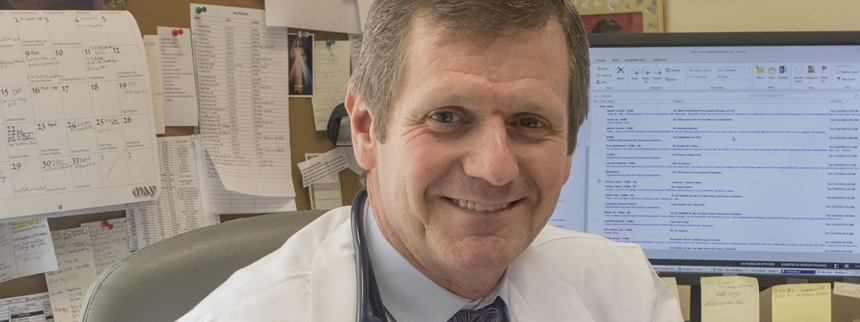
John Gisla, a family medicine physician with Mercy Medical Group in Folsom for the past 20 years, calls his specialty work with women patients using Natural Procreative Technology (NaPro) to treat the underlying causes of infertility a “labor of love.”
“It brings me great satisfaction to help women and couples who are grappling with infertility as well as those who wish to plan their family in a way that is consistent with their moral values,” says John, who is also chair of Mercy Medical Group’s Department of Family Medicine.
“I feel it is my duty to do whatever I can to help them achieve a successful pregnancy. Though I have plenty of patients in my practice, this is an area where I have something that people need -- people who wouldn’t otherwise have any viable options, who might never be able to be evaluated or treated. Often you are able to help someone in that time of crisis.”
A lifelong Catholic, John is the son of Deacon John and Celeste Gisla and a member of St. Stephen the Martyr Parish in Sacramento. He and his wife, Mary Alyce, have three children. He was “raised in the philosophy consistent with the church’s understanding of family life and fertility,” he notes. “So as I was contemplating practicing medicine, I knew I would have to practice in a way that was consistent with my conscience and the teachings of my church. Natural Family Planning (NFP) is always something I intended to be a proponent of and incorporate into my practice.”
More than two decades ago, after graduating from UC Davis School of Medicine and in his third year of a family medicine residency at Mercy-sponsored Methodist Hospital in south Sacramento, John took advantage of a grant offered to a physician to be trained in the new and developing NaPro reproductive care. He traveled to the Pope Paul VI Institute in Omaha, Neb., an international research, education, medical and service center, to train with Dr. Thomas Hilgers and to develop a specialty in the Creighton Model FertilityCare and NaPro.
This type of reproductive care addresses gynecologic and fertility problems “in a manner consistent with natural law and the church’s vision for fertility and family life,” he notes. “It gives women knowledge of their body and how their fertility works. This knowledge empowers them to make decisions about how their want to live their lives and to avoid pregnancy by avoiding fertile days, if that’s what they want to do. But it also has tremendous application for treating gynecological conditions, whether it be Dysmenorrhea (painful periods), premenstrual syndrome, ovarian cysts, abnormal bleeding, menstrual migraines and moods, as well as fertility problems.”
While in vitro fertilization (IVF) is one of the most high profile and popular of the reproductive technologies offered to many women who suffer from infertility, IVF, artificial insemination and other similar techniques come at a high cost – financially, physically, emotionally and spiritually, John notes. From a moral perspective, IVF also involves the creation of embryos in a laboratory that are then implanted into the uterus. If the embryos begin to grow, one or more are almost always aborted. Unused embryos are frozen and stored.
With NaPro, women use a specially-designed method to track their cycles and find the underlying cause of their infertility. The doctor then prescribes either medical treatment or surgery aimed at making conception possible.
Over the years, John has treated dozens of women in his practice who are grappling with infertility, whether Catholic, Christian or non-Catholic. “The standard in mainstream medicine in infertility is to do very little evaluation into the underlying cause of infertility,” he says. “Infertility is a symptom of something. But with the advent of artificial reproductive technologies, research into the underlying causes of fertility has often come to a standstill."
He is grateful that Mercy Medical Group “from the beginning has given me the opportunity to practice in a way consistent with my conscience. I’m not obliged to prescribe contraception or refer for sterilization or IVF. I’ve never had any difficulty providing women with various alternative options.”
John promotes the work of Dignity Health Women’s Services, which teaches women and married couples about the Creighton Model and NaPro, and encourages any other parish-based or community programs which provide information on achieving pregnancy and treating infertility. “It’s the demand that will create the supply,” he says. “We need to get the information out more widely. My years of talking to people about these issues tells me the ‘secret sauce’ for convincing people is to present the truth, talk about it, and let the truth speak for itself.”

